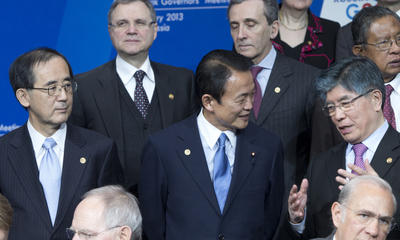Next year may be the last opportunity to refocus the agenda to concentrate on a few big issues, where collective action by the G20 will be essential to solve systemic policy and market failures.
Economic and financial problems will continue to need attention for quite some time. Fortunately, G20 leaders are shifting attention from crisis management to look for new ways to revive a world economy operating well below capacity. They also need to look beyond macroeconomics and finance. The window of opportunity to avoid disastrous climate change is closing fast, and the future of an open, non-discriminatory, WTO-based regime for international commerce is being undermined, almost daily, by preferential trade deals. The G20 cannot wait much longer before accepting responsibility for restoring respect for the WTO — by bringing it up to date with 21st-century international commerce and for scaling up commitments to contain global warming.
To give enough attention to these big issues, the G20 must find the courage to sweep many items off the agenda. For example, G20 leaders cannot afford the time to run a new aid organisation. Marginal improvement in the quality or quantity of aid is no substitute for safeguarding the international environment needed for low-income countries to escape from poverty by confident engagement in global production networks.
The G20 also needs better collective leadership.
A transition in the role of Asian countries at the G20 — from cautious and sometimes defensive to visionary and exemplary — was expected to unfold slowly, possibly taking a decade or more. But the continuing threat to recovery arising from the self-created problems of the United States and the European Union has created an urgent demand for Asian leadership. An Asian style of leadership suits the G20. Good leadership does not mean demanding instant agreement from others. Nor does it mean trying to use the G20 to impose new rules on each other, or on those not at the G20 table. The G20 must remain a consensus-building forum — and consensus building takes time.
Useful leadership can be a quiet, but firm, resolve to make sure that G20 leaders find mutually beneficial solutions for adequate fiscal and monetary policy coordination, managing today’s international commerce and avoiding disastrous climate change. Once G20 governments decide it is in their own interests to act in line with a new consensus, then they can be expected to follow through. Any attempt to force action without a shared perception of net mutual benefit is doomed to fail and will swiftly undercut the credibility of the group.
It will take a long time to find consensus on how to contain, let alone resolve, problems. In a voluntary process of cooperation like the G20, there will be no big breakthroughs in any one year. Therefore, the G20 cannot afford to defer constructive discussion of big problems. A more prudent option is to start a discussion of these issues in a patient, non-confrontational manner.
To help revive global demand and growth, the G20 is putting investment in economic infrastructure at the heart of its growth agenda. A better use of huge accumulated savings will help to close huge gaps in infrastructure, inject new effective demand in the short term, then contribute to productive capacity once significant projects are completed. Innovative policy development will be essential, because much of the new investment will need to be from private savings, intermediated through capital markets.
As host of APEC in 2013, Indonesia has taken the lead in this direction, drawing on the experience of ASEAN. To implement the ASEAN Economic Community, ASEAN governments have already committed to specific investments based on an excellent Master Plan on ASEAN Connectivity. Options for financing these investments include potential public–private partnerships and an ASEAN Infrastructure Fund in cooperation with the ADB. APEC is developing its strategy to boost economic infrastructure in close cooperation with the private sector and multilateral development banks. The top priority is investment to improve connectivity. Better transport and communications links among economies will contribute far more to economic integration than any of the trade deals under consideration.
This is an early example of the many ways regional cooperation can contribute to solving global problems. Based on what is happening in the Asia Pacific, all members of the G20 can start, right now, to work constructively to solve a shared policy problem, rather than blaming each other for too little growth, too much liquidity or too many exports. A significant joint effort to solve an important set of policy and institutional problems, then achieving practical results, can energise the G20 process as a whole.
Andrew Elek is Research Associate at the Crawford School of Public Policy, the Australian National University. He was the inaugural Chair of APEC Senior Officials in 1989.

